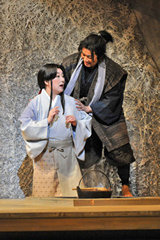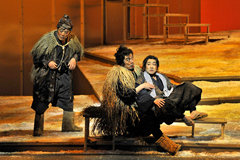| Opera Reviews | 26 April 2024 |
The subtlety of falling snowby Kris Kosaka |
|
| Ikuma: Yuzuru New National Theatre Tokyo February 2011 |
|
|
Following a famous Japanese folktale, Yuzuru dramatizes the story of Tsu, an injured heron saved by a kindly villager, Yohyo. In gratitude, Tsu secretly transforms to human form, becoming Yohyo's wife. The curtain opens safely within their happily married world, the two frolicking with the village children in a joyful representation of the simple pleasures in life. Some time earlier, Tsu has presented her husband with a rare, valuable cloth made from the feathers of a live heron, (unknown to the naïve Yohyo, woven painfully from her own feathers) a representation of her love and gratitude and not intended for material gain. The conflict of the opera is thus as simple as the original folk tale: two friends from the city tempt Yohyo with the possible riches from these valuable cloths, and Yohyo begs, cries, and finally demands that Tsu weave more of the priceless material. The opera ends with Tsu giving into Yohyo's pleas, but he violates her sacrifice by spying on her work and discovering her secret; she flies away, and the curtain falls on his despairing cries. Western audiences will have a problem with the characters: they are a painfully honest illumination of idealized female / stereotypical male roles within the Japanese psyche that can not resonate with the same authenticity to the typical western viewer. Yohyo acts like a good natured simpleton, easily led by the group's demands, morphing into a spoiled child, indulging in a full tantrum when his demands are refused by Tsu. |
|
|
Yuzuru also reveals a Japanese reserved aesthetic sensibility in marked contrast to the lavishness we usually expect in western opera. The set never changes, only the density of snow falling, a barometer of emotion towards the happenings onstage. Action narrows to the simple interactions between Tsu and Yohyo, with little to relieve the emotional intensity of their duets except occasional antics from the evil friends, and the carefully timed interruptions of the village children, singing traditional warabe-uta, Japanese children's songs. With so little action, the poetic libretto becomes the focus. The absence of subtitles in any language was sorely missed in this production, although there was admittedly nothing to detract from the striking set. Although Yuko Kamahora as Tsu and Yasuhiko Idane as Yohyo sang beautifully, and the subdued loveliness of the staging made me appreciate Japanese aesthetics all over again, Yuzuru will not entirely please all western audiences. Yuzuru is best enjoyed if taken as an important cultural landmark in Japanese opera, as an insightful and gorgeous glimpse inside the archetypes of Japanese society, as an opportunity to scale back the world to a more simple essence, reduced to measuring a human tragedy by the softly falling snow. |
|
| Text ©
Kris Kosaka Photos © Chikashi Saegusa / New National Theatre Tokyo |

 Snow
falls perpetually in the backdrop as the simple, stark staging reflects
the simple, stark reality of overriding greed. Opera is not usually
known for its understatement, but this opera is from Japan, a culture
long recognized for its subtlety and reserved culture of shadows and
silence. Yuzuru (Twilight Heron) by Dan Ikuma premiered in 1952
and marked a significant change in the assimilation of this classical
western art form in Japan. Yuzuru remains a popular classic in
Japanese opera today. The New National Theatre Tokyo's recent production
reveals both the elegance and the esoteric Japan-ness of this quietly
beautiful work.
Snow
falls perpetually in the backdrop as the simple, stark staging reflects
the simple, stark reality of overriding greed. Opera is not usually
known for its understatement, but this opera is from Japan, a culture
long recognized for its subtlety and reserved culture of shadows and
silence. Yuzuru (Twilight Heron) by Dan Ikuma premiered in 1952
and marked a significant change in the assimilation of this classical
western art form in Japan. Yuzuru remains a popular classic in
Japanese opera today. The New National Theatre Tokyo's recent production
reveals both the elegance and the esoteric Japan-ness of this quietly
beautiful work.  The
female lead represents the quintessential sacrificial woman, strong in
her patience, endurance, and willingness to give body and soul to her
mate. Echoes certainly remain in today's idealized Japanese social hierarchy,
and while western audiences may easily accept the one dimensional evil
stepmother of Hansel und Gretel, Yuzuru's characters will be too
unfamiliar and seemingly one-sided for complete believability.
The
female lead represents the quintessential sacrificial woman, strong in
her patience, endurance, and willingness to give body and soul to her
mate. Echoes certainly remain in today's idealized Japanese social hierarchy,
and while western audiences may easily accept the one dimensional evil
stepmother of Hansel und Gretel, Yuzuru's characters will be too
unfamiliar and seemingly one-sided for complete believability. 





